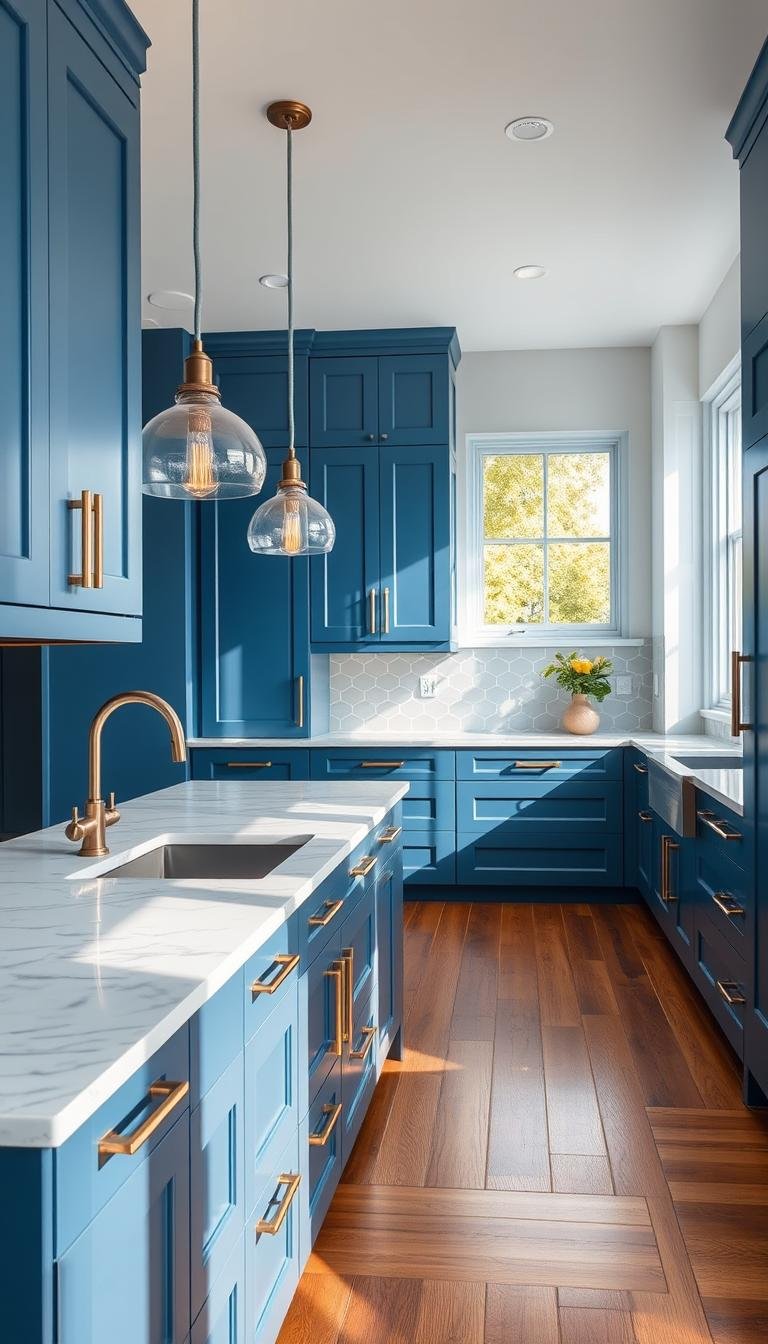This post may contain affiliate links. If you click and buy, we may earn a small commission at no extra cost to you. Learn more.
Turn your kitchen into a place where nature and function meet. An earthy kitchen combines warm, natural elements with smart design. It creates a calm space for cooking and connecting.
Picture sunlight on wooden counters, herbs in pots, and soft textiles adding warmth. An earthy kitchen uses wood, stone, and plants to bring outdoor beauty inside. This trend is growing as people want spaces that boost well-being and harmony.
Learn how to choose colors, use natural materials, and set up smart lighting in your kitchen. Whether you’re redoing your kitchen or just updating a few things, this guide has tips for every budget and style. Let’s see how to make your kitchen a peaceful, earthy retreat.
Contents
- 1 Understanding the Earthy Kitchen Aesthetic
- 2 Choosing an Earthy Color Palette
- 3 Selecting Natural Materials for Your Kitchen
- 4 Lighting to Enhance Your Earthy Kitchen
- 5 Furniture Styles to Complement an Earthy Kitchen
- 6 Appliances that Fit the Earthy Theme
- 7 Incorporating Plants into Your Kitchen
- 8 Personalizing with Earthy Decor Accessories
- 9 Open Shelving vs. Closed Cabinets
- 10 Sustainable Practices for Your Earthy Kitchen
- 11 Final Touches for the Perfect Earthy Kitchen
Understanding the Earthy Kitchen Aesthetic
Earthy kitchen design combines nature’s beauty with practical spaces. It’s all about earth-inspired interiors that bring materials, colors, and nature together. These spaces are simple, authentic, and welcoming, feeling timeless.
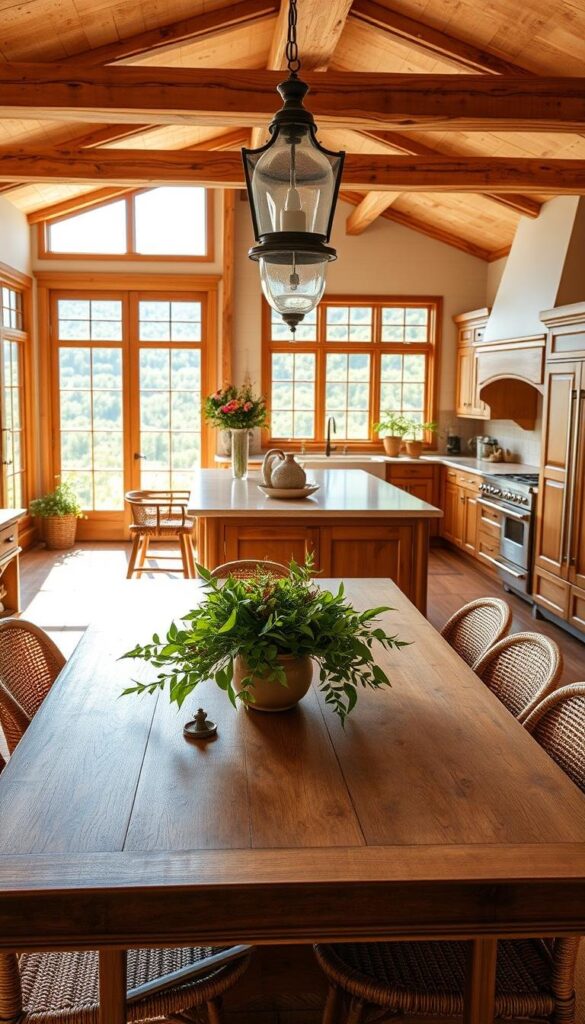
The Concept of Earthy Decor
This style is inspired by global traditions like Scandinavian hygge and Japanese wabi-sabi. It values imperfections and organic textures, making spaces feel grounded. Imagine handcrafted pottery next to modern countertops, blending old-world charm with today’s needs.
Key Elements of Earthy Design
- Natural materials: Wood, stone, and clay are key, adding warmth and lasting quality.
- Organic forms: Curved edges on tables or asymmetrical shelves echo nature’s patterns.
- Textural layers: Mixing woven baskets, smooth marble, and rough-hewn brick adds depth.
Benefits of an Earthy Kitchen Environment
Living in an earthy kitchen does more than make your home look good—it boosts well-being.
“Spaces tied to nature reduce stress and foster creativity,” says interior designer Maria Chen, founder of GreenRoot Design. “The textures and muted tones ground the mind.”
These kitchens also stay on-trend, avoiding outdated looks. Picture sipping coffee at a reclaimed-wood table under soft pendant lights. Every detail supports calm and purpose.
Choosing an Earthy Color Palette
Color is the heartbeat of any natural home design. An earthy kitchen loves colors that feel like nature. Start with warm neutrals that remind us of the outdoors. These colors calm your space and highlight organic beauty.
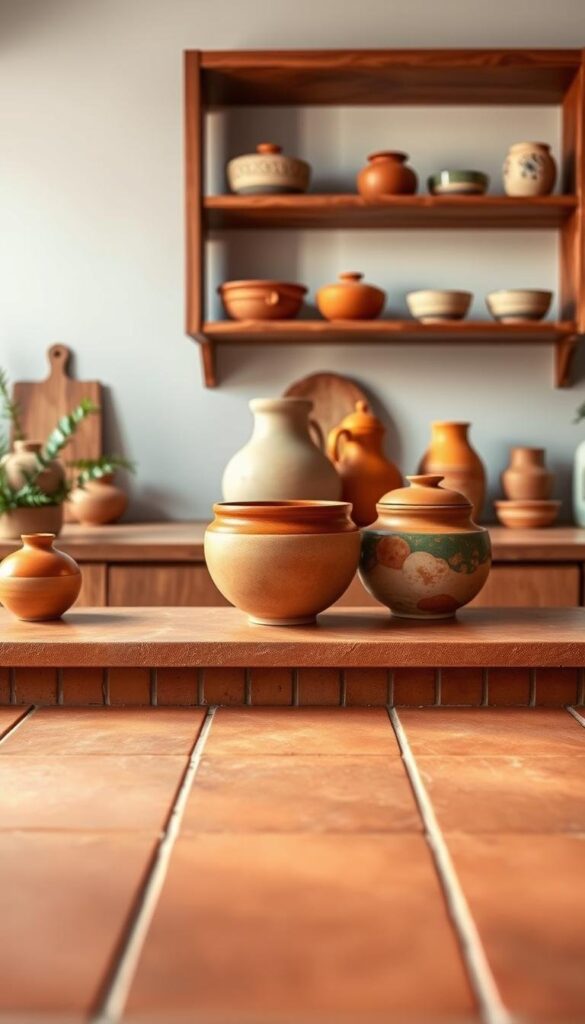
Warm Neutrals and Earth Tones
Build your palette with these foundational shades:
- Beige or creamy ivory for soft, sunlit walls
- Sage green to evoke fresh foliage
- Dark browns like espresso or driftwood for cabinetry
Accent Colors to Consider
Bring energy with subtle pops of these hues:
- Rust-orange for warmth
- Deep teal to mimic natural waters
- Mustard yellow for a cheerful contrast
Tips for Color Combinations
Follow these rules to balance your scheme:
- Use 60% neutrals, 30% secondary tones, and 10% accents.
- Test colors at dawn, noon, and dusk to see how light affects them.
- Pair earthy greens with terracotta for a cohesive look.
Remember, natural home design thrives on harmony. Experiment with small samples before committing. Let the colors tell a story of simplicity and connection to the environment.
Selecting Natural Materials for Your Kitchen
Turn your kitchen into a rustic cooking space with natural materials. Choose textures and elements that feel organic. This will bring warmth and make your kitchen last longer.
Focus on materials that are both durable and beautiful. This way, your kitchen will be both useful and full of soul.
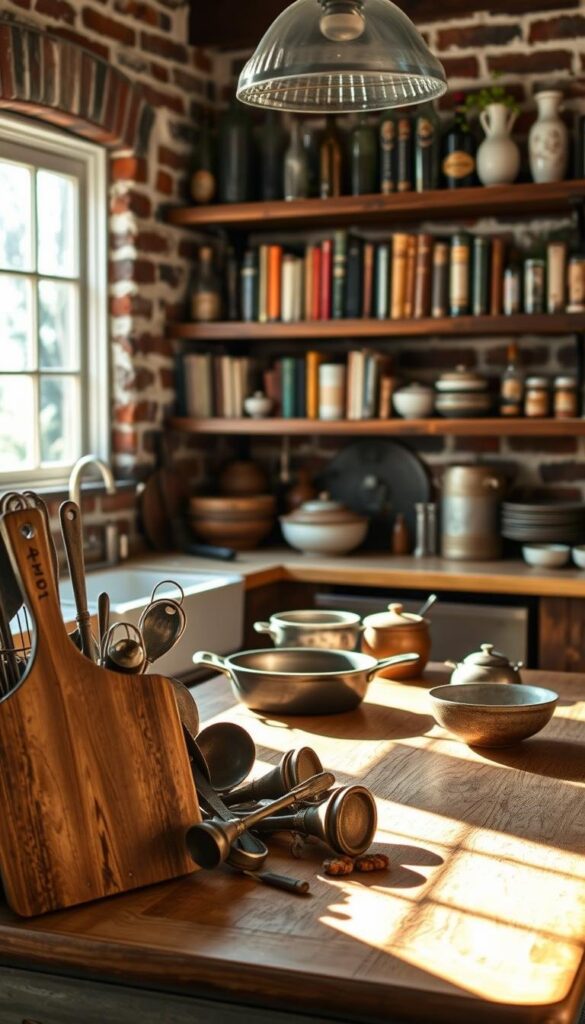
Wood: A Timeless Choice
Wood is key to a rustic kitchen. Choose from oak’s classic look, maple’s smooth feel, or reclaimed wood for a story. Use it for floors, cabinets, or open shelves to add depth.
For countertops, think about butcher block or live-edge slabs. They show off nature’s beauty with their imperfections.
Stone and Tile Options
- Granite or marble countertops resist stains and add elegance.
- Soapstone’s muted tones complement earthy colors.
- Eco-friendly terracotta tiles or handcrafted stone backsplashes bring the outdoors in.
Incorporating Textiles
Add softness with linen curtains, hemp towels, or wool rugs. Use neutral colors to make the space cozy. Mix patterns like woven burlap or hand-loomed cotton for a tactile feel.
Lighting to Enhance Your Earthy Kitchen
Let there be light! Proper lighting makes an earthy kitchen feel alive and welcoming. Start by letting nature’s glow in. Open shutters, use sheer curtains, or add mirrors to bounce sunlight onto wooden cabinets or stone countertops.
Reflective surfaces like polished marble or light-colored tiles amplify natural light. This makes materials like rattan or terracotta pop.
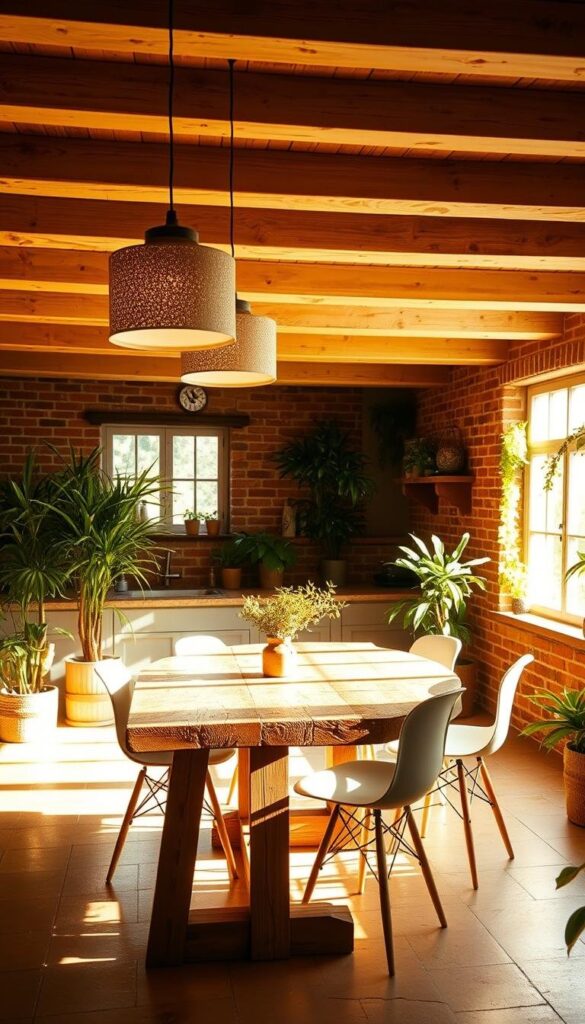
Natural Light: Maximizing Sunlight
Upgrade window treatments to let in more light without glare. Sheer linen curtains or bamboo blinds work well. Place light-colored rugs or glassware near windows to create a bright, airy feel.
Types of Light Fixtures
- Pendant lights with woven rattan or ceramic shades add warmth.
- Warm LED bulbs (2700K-3000K) mimic sunset hues, ideal for earthy tones.
- Track lighting offers flexibility—highlight backsplashes or hanging herb gardens.
- Under-cabinet lights prevent shadows while prepping meals.
Creating a Cozy Ambiance
Layer light sources for mood shifts. Use dimmer switches to adjust brightness during dinner parties. Candles in ceramic holders or lanterns add soft glows.
Accent spots under open shelves highlight handmade pottery or dried flowers.
“Lighting isn’t just practical—it’s the heartbeat of your earthy kitchen’s vibe.”
Blend these tips to make your space both functional and soul-soothing. Every flick of a switch should deepen that connection to nature.
Furniture Styles to Complement an Earthy Kitchen
Choosing the right furniture makes an earthy kitchen both beautiful and useful. Mix style with sustainability for a design that shows your values. First, pick between rustic or modern looks to guide your choices.
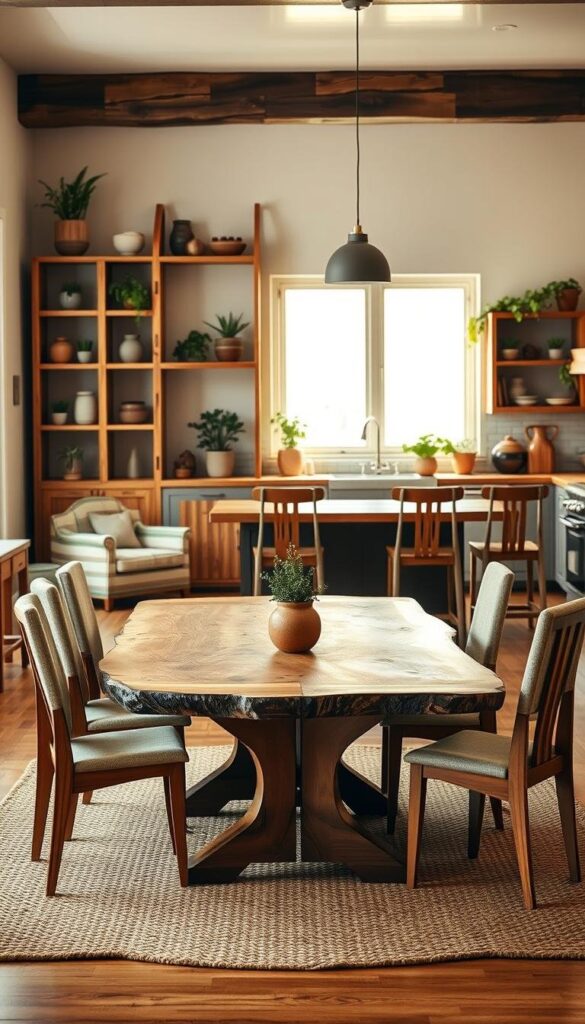
Rustic vs. Modern Earthy Designs
- Rustic: Go for weathered wood, handcrafted details, and textured fabrics for a farmhouse feel.
- Modern: Choose clean lines in natural materials like bamboo or marble, with sleek storage for a contemporary look.
Essential Pieces for Functionality
Look for items that do more than one thing to avoid clutter. A strong kitchen island is great for prep and as a meeting spot. Built-in shelves save space and show off your decor.
Choose seats like woven chairs or upholstered benches for comfort and style.
Sustainable Furniture Options
Choose sustainable kitchen ideas like FSC-certified wood or reclaimed oak tables. Pick local pieces to cut down on carbon footprints. Non-toxic finishes and modular designs last longer, fitting eco-friendly choices.
Even small items like bamboo cutting boards or ceramic vases bring a green touch.
Appliances that Fit the Earthy Theme
Updating your kitchen doesn’t mean giving up on eco-friendly decor. Today, you can find appliances that are both green and stylish. They keep your kitchen both useful and in tune with nature.
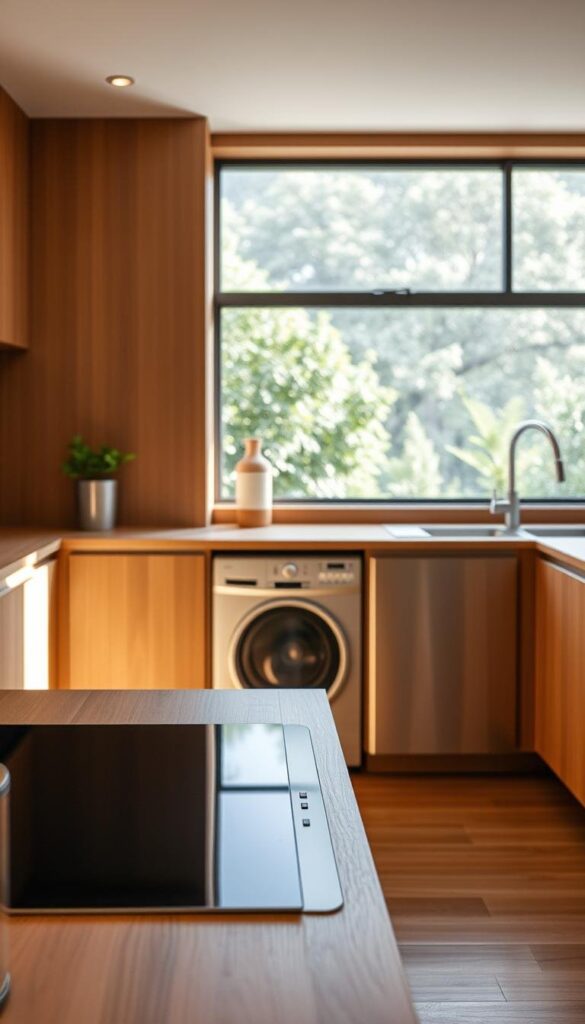
Energy-Efficient Choices
Choose appliances with the ENERGY STAR label, like Bosch’s induction cooktops. They use 50% less energy than gas stoves. Also, pick dishwashers with water-saving cycles from Frigidaire. These choices save money and help the planet, all while fitting in with your natural decor.
Stainless Steel vs. Retro Appliances
Stainless steel appliances have a sleek, neutral look that goes well with wood. For a retro vibe, consider KitchenAid’s pastel refrigerators. Choose colors like olive green or terracotta to keep your kitchen looking cohesive.
Integrating Tech and Nature
Hide your appliances behind wood panels or use open shelving. This way, appliances like slow juicers or solar chargers become part of your decor. Warm-toned tech finishes, like matte black or copper, blend well with organic themes. A kitchen designer suggests:
“Pair minimalist tech with natural textures—like a stone backsplash behind a smart fridge—to balance innovation and earthy warmth.”
- Use matte finishes instead of glossy surfaces
- Match appliance colors to cabinetry tones
- Choose models with visible energy-saving features
Small details, like bamboo drawer organizers or solar lights, add to the green theme. By focusing on both looks and function, your appliances become a natural part of your kitchen.
Incorporating Plants into Your Kitchen
Turn your kitchen into a green living space with the right plants. These plants don’t just add color. They purify air, boost mood, and connect you to nature. Even small spaces can thrive with the right plants.
Benefits of Indoor Plants
Plants like basil and aloe vera clean the air and add moisture. They reduce stress, making your kitchen a calm place. Their presence also boosts creativity, great for cooking.
Best Plants for Kitchen Environments
- Herbs: Basil, rosemary, and thyme grow well on kitchen windowsills. They’re also great for cooking.
- Pothos: It does well in low light. Its vines add movement to shelves.
- Succulents: Jade plants or snake plants need little water. They’re perfect for busy cooks.
Creative Planter Ideas
Use mason jars for herb gardens or hang plants from ceiling hooks. Build a mini vertical garden on a blank wall. Put pots in nooks near the sink.
Floating shelves can show off small succulents. Reclaimed wood planters add a rustic touch.
“Even a single potted plant can turn a room into a sanctuary.”
Personalizing with Earthy Decor Accessories
Adding personal flair to your kitchen doesn’t mean sacrificing the earthy vibe. Every accessory tells a story—here’s how to curate pieces that enhance your space while staying true to earth-inspired interiors.
Art and Wall Decor
Hang art that mirrors nature’s beauty. Frame large-scale botanical prints or monochrome forest scenes. Local artisans or online platforms like Etsy offer handwoven tapestries and sculptural driftwood pieces.
A well-placed quote in weathered metal or reclaimed wood adds character without clutter.
Choosing the Right Cookware
Cookware becomes decor when displayed openly. Opt for copper pots stacked on open shelves or matte black cast iron from brands like Lodge. Hand-painted ceramic dishes by Missoni Home or geometric clay vessels add color.
Even wooden cutting boards from Williams Sonoma double as countertop art.
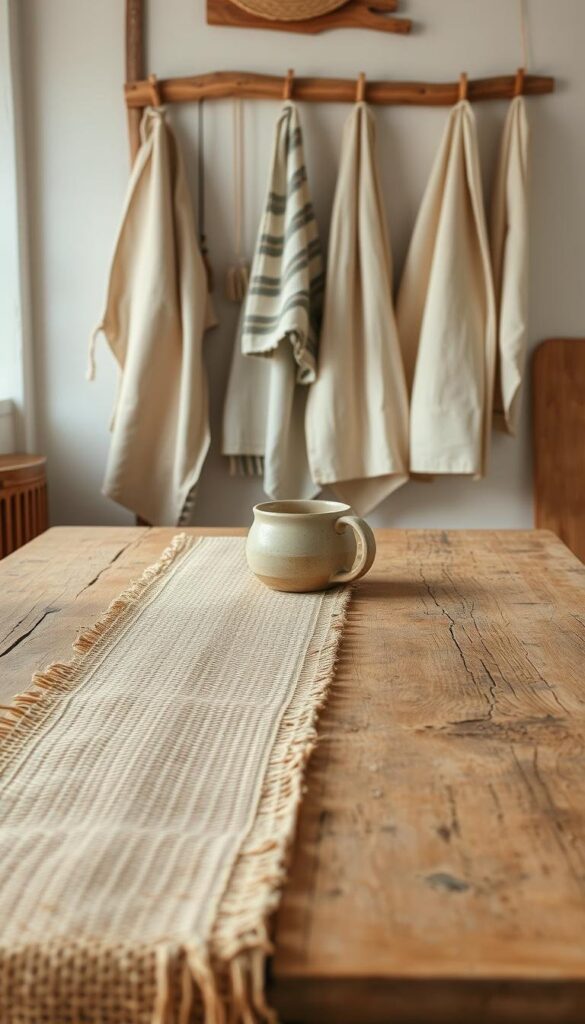
Textiles: Rugs, Curtains, and Cushions
Layer textures with jute rugs from West Elm or hand-knotted wool throws. Use linen curtains in sage or terracotta to soften windows. Mix woven basket-style cushions with hand-loomed patterns for depth.
These materials absorb sound and warmth, perfect for cozy gatherings.
“Accessories should reflect the life you live—mix heirlooms with new finds.”
Sources like Anthropologie or local flea markets offer unique textiles. Prioritize natural dyes and organic fibers to align with eco-conscious earth-inspired interiors. Every piece should feel like an intentional choice, not just decoration.
Open Shelving vs. Closed Cabinets
Designing an earthy kitchen means choosing between open shelving and closed cabinets. This choice affects both style and function. It’s key to creating spaces that mix natural home design with practicality.
Pros and Cons of Open Shelving
- Pros: Open shelves make spaces feel lighter, show off decorative items, and save space.
- Cons: They can collect dust, need constant tidying, and show clutter.
How to Style Open Shelves
Balance looks and function on open shelves. Try:
- Stack plates vertically for a rustic look.
- Add potted herbs or small succulents for green touches.
- Use woven baskets or ceramic jars to store snacks or spices quietly.
Choosing Cabinet Styles for an Earthy Kitchen
For closed cabinets, choose materials and finishes that match natural looks:
- Shaker-style cabinets with matte finishes.
- Reclaimed wood panels for a weathered look.
- Dark wood tones with lighter wood shelves for contrast.
Mixing open and closed storage brings balance. Think about what suits your lifestyle. Do you prefer clean lines or a cozy, cluttered feel?
Sustainable Practices for Your Earthy Kitchen
Make your kitchen a green space by choosing wisely. Focus on organic food preparation and eco-friendly habits. These actions help the planet and improve your meals.
Eco-Friendly Products and Materials
Choose natural over synthetic. Opt for:
- Bamboo utensils from brands like To-Go Ware
- Cast iron pans that last generations
- Stoneware storage containers instead of plastic
These picks cut down on waste and add to your kitchen’s natural look.
Waste Reduction Strategies
Reduce clutter and harm to the environment with smart solutions:
- Install sleek compost bins (try Earthwise stainless steel models)
- Use beeswax wraps to replace cling film
- Repurpose jars for dry goods storage
Set up a corner with woven baskets for recyclables. It keeps things tidy and green.
Grow Your Ingredients
Turn your kitchen into a mini farm. Try:
- Herb pots on windowsills (basil, thyme thrive in sunlight)
- Microgreens in shallow trays under LED grow lights
- Vertical planters for compact spaces
Growing your own food boosts organic food preparation quality. It also reduces grocery waste.
“Small steps like homegrown herbs create big impacts on sustainability.” — EPA Sustainable Living Guide
Every choice, from cookware to composting, makes your kitchen a place of beauty and responsibility.
Final Touches for the Perfect Earthy Kitchen
To make your earthy kitchen perfect, every detail must work together. These final steps will help you make your space feel intentional and warm.
Creating a Cohesive Design
Balance textures and colors for a cohesive design. Warm neutrals can tie wood, stone, and textiles together. A consistent material palette, like oak cabinets with jute rugs, brings harmony without clutter.
Essentials for Comfort and Functionality
Comfort comes from practical details. Adjustable seating at a breakfast bar and ergonomic countertops are key. Add task lighting under cabinets and storage systems for easy access to essentials.
Inviting Guests into Your Space
Make your kitchen welcoming with a central island or nook. Display herbs in a windowsill garden or set out recipe cards. These touches make cooking a shared experience, blending function with hospitality.
Your earthy kitchen will grow and change as you do. Add personal mementos and seasonal plants over time. Choose items that reflect your values, and your kitchen will become a place of nourishment for meals and moments.
To bring you cozy inspiration more efficiently, we sometimes use AI to assist in content creation — but every word and idea is carefully shaped by our team. See our AI Disclosure for more info.



